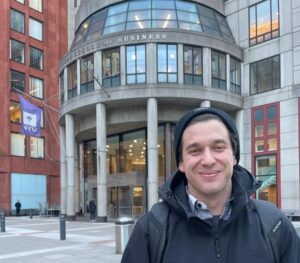The Czech Economic Society awarded its annual “Young Economist of the Year” prizes to three economists under the age of 30 who submitted their original professional work to the competition. Third place was awarded to a CERGE-EI PhD candidate Ante Šterc and his paper “Limited Consideration in the Investment Fund Choice.”
Ante Šterc is a PhD candidate at CERGE-EI. His research interests consist of household finance and macroeconomics. He is particularly interested in household heterogeneity concerning wealth and essential characteristics for household finance, including education and financial literacy.
Good Morning, Ante. It’s a pleasure to meet you.
Could you introduce yourself briefly? Where are you from, where did you study, and what was your journey to CERGE-EI like?
Ante Šterc: It’s a pleasure to meet you as well. I come from the capital of Croatia, Zagreb. I got my bachelor’s in Mathematics and master’s in Financial and Business Mathematics at the Department of Mathematics in Zagreb. The idea of pursuing PhD in Economics and interest in Economics started there as well. After studying the modeling background and obtaining tools to solve and understand complex models, I wanted to learn more about Economics and how to model complex reality using mathematical models. At CERGE-EI, I got that; I was able to use my modeling knowledge from before, learn new modeling approaches and apply them to Economics. In addition, by taking diverse courses from excellent faculty members at CERGE-EI, I learned more about state-of-the-art computational techniques and econometric modeling and, most importantly, gained economic intuition.
How do you feel about receiving the third Young Economist Award from the Czech Economic Society?
A.Š.: I am very proud of getting the award. When doing research, it is always nice to hear and feel that you are on the right track with your research ideas and that there is some value in your research. I am thankful to the Czech Economic Society for recognizing my research.
Please tell us what your winning entry is about.
A.Š.: My paper “Limited Consideration in the Investment Fund Choice” explores the decision process behind the investment choice. In contrast to standard portfolio modeling and choosing the share of bonds and stocks in your portfolio, I model this choice through financial intermediaries.
Describe how the symmetry model works in household information and decision-making across different households. Can this model be used in real life?
A.Š.: I model investment choice as a discrete choice between different investment funds to make an investment decision for most households as realistic as possible. I evaluate my model on the Survey of Consumer Finances dataset, as it contains details on the personal finances of US households. The main result of my paper states that households have limited consideration; they do not consider all the available investment fund options and, thus, make mistakes and face monetary losses. I find that financially skilled households face smaller losses. Results from my model imply that policies such as financial education could benefit financially unskilled households in their investment decisions and improve their gains from financial decisions.
How did you find out about CERGE-EI? Was there anyone who inspired you to study here?
A.Š.: I heard about it in my Master’s Programme, as we were instructed to remain in our math-intensive paths throughout our careers. Math-intensive approach to Economics seems like a perfect fit.
What do you remember about your studies at CERGE-EI? Would you recommend studying at CERGE-EI to your friends?
A.Š.: I will remember CERGE-EI the most about a few faculty members who were approachable and always had time for students. During the coursework period, I loved implementing estimators in Econometrics and Time Series classes with Stanislav Anatolyev, as this somewhat resembled what I did in my Master’s. I was always fond of every Macro class we had, and I believe this is due to the great set of lecturers. More recently, the best example of efficient teaching is teaching through practice – in the macro reading group led by Marek Kapička and Ctirad Slavík. Every week they listen to our presentations and help us develop papers based on a small idea we are thinking about. They can always plug into our mindsets, which may not always be easy, and I admire them for that.
Thank you for the interview.

